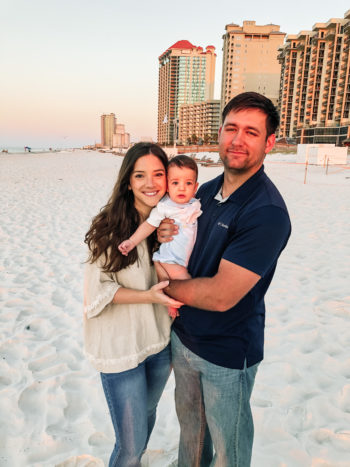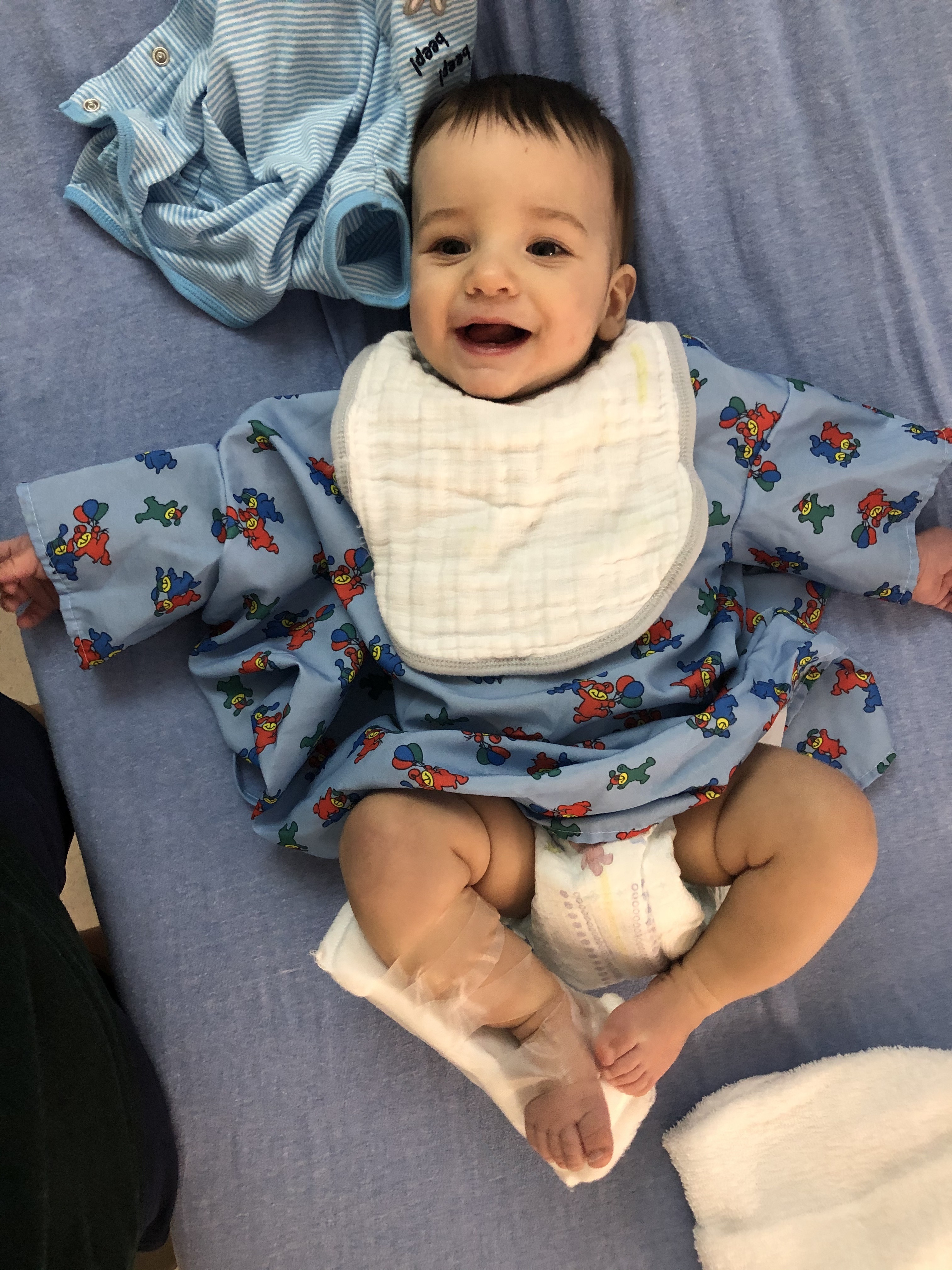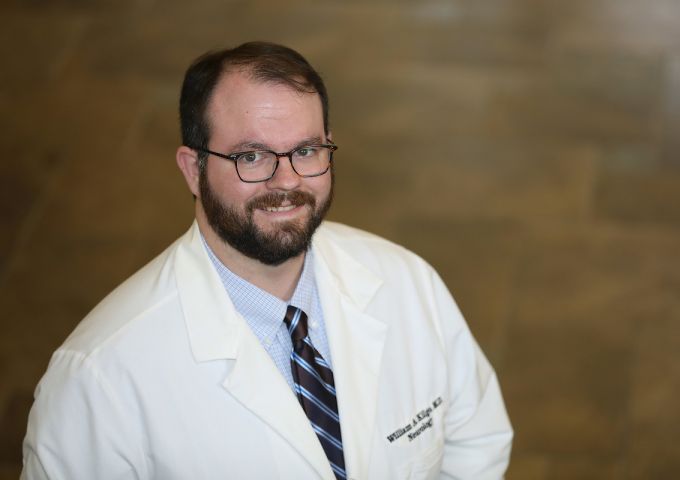
USA Health Magazine: Pediatric emergency care in the time of COVID
The Westphals traveled to Gulf Shores, Ala., in early September for what was supposed to be a relaxing vacation at the beach with their families. The getaway went awry when their 6-month-old baby developed a life-threatening condition that required immediate emergency treatment.
By Lindsay Lyle
[email protected]

The Westphals traveled to Gulf Shores, Ala., in early September for what was supposed to be a relaxing vacation at the beach with their families. The getaway went awry when their 6-month-old baby developed a life-threatening condition that required immediate emergency treatment.
Originally from Lafayette, La., the young family lives in Columbus, Ga., where Lance Westphal is stationed in the U.S. Army and Elizabeth Westphal works as an emergency room nurse at the regional hospital.
“The morning after we arrived in Gulf Shores, Bennett was extremely lethargic, not drinking his bottles – just not himself,” Elizabeth Westphal recalled of her son’s symptoms.
She and her husband took Bennett to the nearby emergency department at South Baldwin Regional Medical Center in Foley, Ala. There, he was diagnosed with intussusception, a condition in which part of the intestine “telescopes” into itself, causing a bowel obstruction. Based on the complexity of Bennett’s condition, the hospital referred him emergently to Children’s & Women’s Hospital in Mobile, about a 50-minute drive from Foley.
Being a nurse herself, Elizabeth Westphal understood the seriousness of her son’s illness. “It was really hard for me to let go of control in an emergency situation,” she said. “I had a lot of questions. I was really scared. I had to take off my nurse hat and just be his mom. I cried and prayed the entire way to Mobile.
The ambulance took Bennett to the pediatric emergency department of Children’s & Women’s Hospital, while Elizabeth Westphal entered through the main hospital entrance to be screened for COVID-19. As someone who cares for COVID patients regularly, she respected the safety measures that were in place; but as a mother, it didn’t make being separated from her son any easier.
“In the moment,” she said, “I definitely thought, ‘This is the worst day of my life.’”
Adding to the challenges, nationwide safety protocols during the pandemic stipulated that only one caregiver could be with Bennett in the hospital.
“I trust the precautions that we have to take right now,” Elizabeth Westphal said. “That said, it was really hard with my husband not being able to come inside; because Bennett needed both of us, and I really needed my husband for support.”
Shelby Sheffield, RN, a nurse in Children’s & Women’s emergency department, was among the providers who cared for Bennett. She said the staff understands the anxiety that COVID restrictions add to an already stressful situation for patients and their families. With that in mind, they keep the caregivers informed and updated as much as possible, so the caregivers can share that information with the rest of their family.
“When you try to imagine yourself in the caregiver’s position, it allows you to treat others how you would want to be treated,” she said.
Once Elizabeth Westphal made it to the emergency department, Bennett’s healthcare team already had sprung to action. Larry Mellick, M.D., chief of USA Health’s pediatric emergency medicine division, explained Bennett’s treatment plan, while Elizabeth Westphal FaceTimed her husband, the technology allowing him to “be in the room” and ask questions.
Mellick said most episodes of intussusception in children are idiopathic, meaning they occur spontaneously without any pathologic cause. Intussusception, the most common abdominal emergency in early childhood, can lead to complications such as vascular compromise, bowel necrosis and even death.
When a patient presents with a possible surgical or life-threatening emergency, Sheffield said, it is crucial for the staff to properly assess and evaluate the patient, so orders and treatment can be initiated in a timely manner. “This timeliness can make a huge difference in the outcome of the patient’s emergent situation,” she said.
“Every minute felt like an hour to me, so I really appreciated how efficient and confident they were. They knew what they were doing,” Elizabeth Westphal said. “Even though Bennett wasn’t fixed yet, I knew he would be with them.”
Radiology confirmed Bennett’s diagnosis with an ultrasound and prepared him for a barium enema. During this procedure, a tube is inserted into the patient’s rectum to introduce a contrast material into the large intestine. This creates pressure within the intestine and “un-telescopes” the intussusception while relieving the bowel obstruction.
Because Bennett was dehydrated from not eating or drinking, he stayed overnight at Children’s & Women’s Hospital for more fluids and monitoring in case the intussusception recurred. The next day, Bennett was discharged from the hospital, and the Westphals rejoined their families at the beach to try to make the best of their remaining vacation.
Five days later, once they were back home in Georgia, Bennett experienced intussusception again. The recurrence necessitated another visit to the ER and a four-night stay at the children’s hospital in Atlanta. This time, the intussusception corrected itself without treatment, but Bennett stayed in the hospital because of complications from a severe stomach virus.
“We went to four ERs in a week’s span, and Children’s & Women’s was definitely the best,” Elizabeth Westphal said. “We still talk about the staff all the time and how great they were.”
Sheffield said she appreciates families like the Westphals for being patient and understanding with the hospital staff as they work together during the pandemic. “We understand that it is not easy during this challenging time, but we do appreciate the teamwork that it takes to provide high-quality care for our patients,” she said.
Elizabeth Westphal expressed her gratitude to everyone involved in Bennett’s care for making her family feel comfortable and in capable hands. “They truly saved Bennett’s life,” she said, “and we are very, very grateful for them.”





